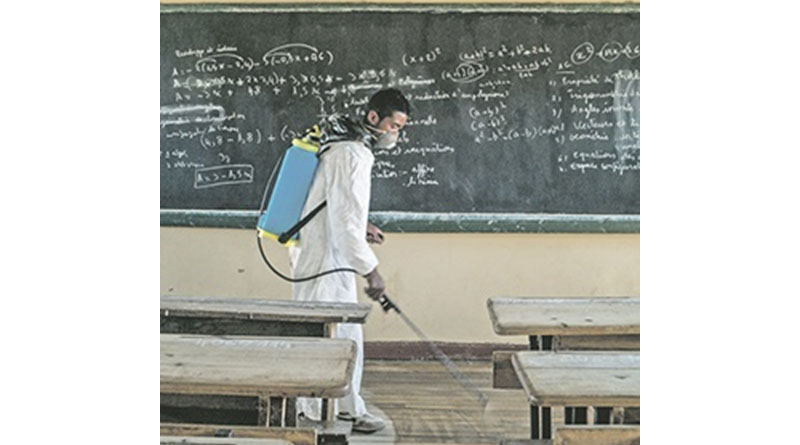R71m to Combat Deadly Plague

Image Caption: A worker from the department of emergency and response to epidemics and disasters disinfects a classroom in a school in Antananarivo, Madagascar, as the plague spreads rapidly in cities across the country. Picture: Henitsoa Rafalia / Anadolu Agency / Getty Images
The World Bank has approved an additional $5m (R71m) funding to help Madagascar cope with its plague outbreak.
The World Bank has answered desperate cries from aid workers for emergency funding to tackle the “worst outbreak in 50 years”.
Cases of the plague have shot up by 37% in less than a week, and the most recent statistics show at least 1 800 people are now infected and 127 deaths have been recorded.
As of October 27, 1 554 reports have been made, of which 985 cases have been identified as pneumonic plague, 230 cases of bubonic plague, and 339 still unknown.
The pneumonic plague is a respiratory infection spread by breathing in airborne droplets and is fatal in almost 100% of cases. The bubonic plague is spread by infected rats via flea bite, and may precede the onset of pneumonic plague.
The “truly unprecedented” outbreak has prompted warnings that it could spread to at least nine nearby countries, namely South Africa, the Seychelles, La Réunion, Mozambique, Tanzania, Kenya, Ethiopia, the Comoros and Mauritius.
Scientists predict that this year’s outbreak may escalate, as it is stronger than the traditional bubonic form that results in at least 400 cases every year in Madagascar.
Figures show that, if current trends continue, the epidemic could strike a further 20 000 people in just a matter of weeks.
Professor Johnjoe McFadden, a molecular geneticist at Surrey University, said the plague was “scary” and was predominantly a “disease of the poor”.
He added: “It’s a terrible disease. It’s broadly caused more deaths of humans than anything else; it’s a very deadly pathogen.”
It is believed that the pneumonic plague caused the Black Death and approximately 50 million deaths in the 1300s. The World Bank said in a press release that the funds would be used in the Emergency National Response plan.
The plan includes the deployment of personnel to the front line in the affected districts; disinfection and fight against insects; cleaning up of vulnerable areas; and for the purchase of fuel for ambulances.
A Malagasy delegation headed by the finances and budget minister, Vonintsalama Andriambololona, had appealed for further financial support to combat the epidemic.
“We are pleased that the World Bank has listened to our call. The ministry promises to closely supervise the good management of such resources in order to quickly tame the epidemic,” Andriambololona said.
The World Bank country manager in Antananarivo, Coralie Gevers, assured that the new financial support would not affect the availability of other funds for Madagascar’s social and infrastructure projects. – Daily Mail and TheEast African
(Source: News24.com)



